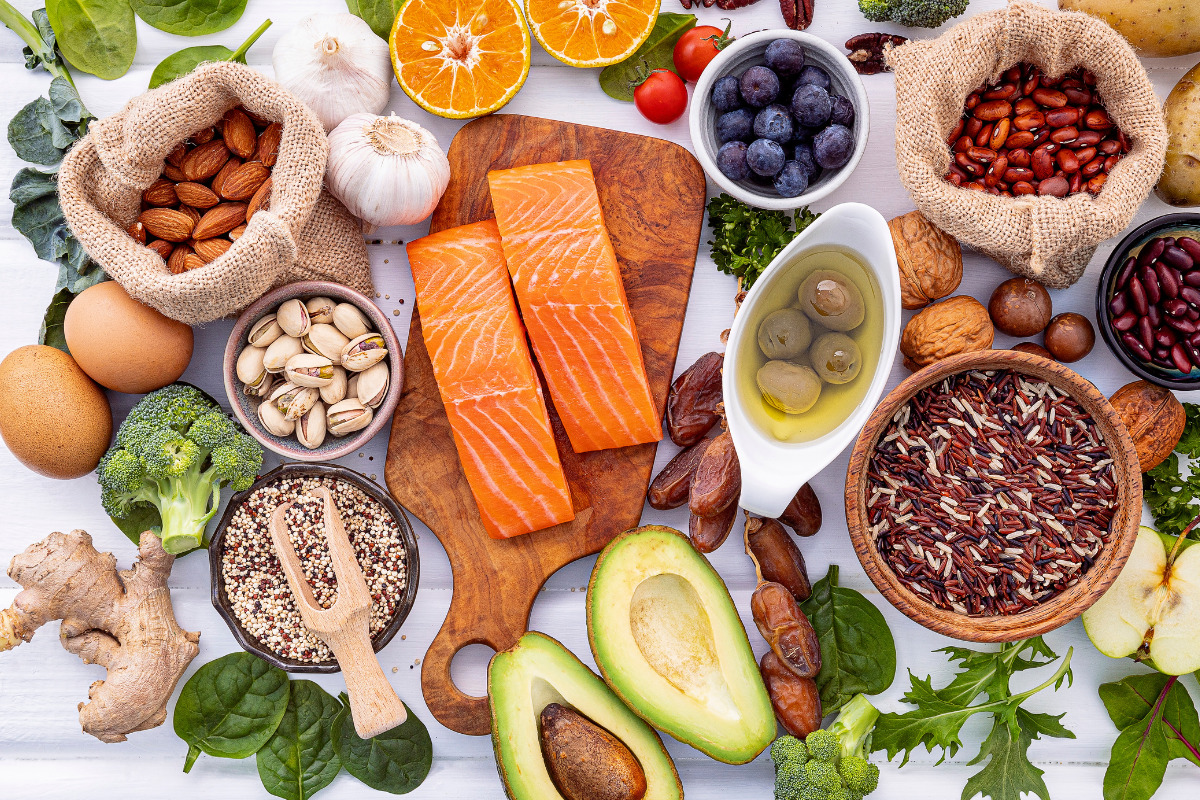Food Sensitivities: Is It Menopause?

Have you recently found that certain foods are causing you discomfort? It could be related to menopause. Changes to your digestive system during the menopause life stage may cause new, uncomfortable food sensitivities.
A food sensitivity or intolerance occurs when a particular food causes gastrointestinal issues, like pain and bloating. When you have food sensitivities, your body struggles to properly break down and digest certain foods. It’s not exactly known why certain people have food sensitivities, but women do tend to have more food sensitivities than men.
Fortunately, through self-discovery or with the support of a clinician or registered dietitian, you should be able to pinpoint the food or food group that’s causing the problem and reduce or eliminate the discomfort.
Signs and Symptoms of a Food Sensitivity or Allergy
A food sensitivity is not the same as a food allergy. The signs and symptoms of a food sensitivity are quite different from those of a food allergy. While a food sensitivity is uncomfortable and a burden at times, but not life-threatening. Food sensitivities are more common, usually occur within a few hours of eating, and cause digestive issues. If you eat a small amount of food, it may not cause any distress.
Food allergies trigger an immune system response and tend to affect the whole body. You can think of food allergies like any other allergy. With a food allergy, within minutes of eating the offending food, even a small amount, your body recognizes the food as an intruder, which triggers your body to fight it off. An allergic reaction can be severe and even life-threatening.
Food sensitivity signs and symptoms include:
- Bloating
- Upset stomach
- Gas
- Diarrhea
- Constipation
- Nausea
- Headache
Food allergy signs and symptoms include:
- Hives
- Swelling
- Itching
- Anaphylaxis
- Dizziness

Can You Become More Sensitive to Certain Foods During Menopause?
A new food sensitivity may arise during menopause or midlife, as food sensitivities can begin at any time. While there isn’t strong evidence to suggest that menopause causes food sensitivities, there is anecdotal evidence.
We know that sodium sensitivity increases during the menopausal transition. This sensitivity can cause occasional fluid retention, also known as edema, after especially salty meals. We also know that menopause brings changes to your digestion. Decreased amounts of the hormones estrogen and progesterone cause digestion to slow. Slower digestion can lead to bloating, gas, and constipation, three symptoms of food sensitivities. However, it’s important to note that food sensitivity symptoms are similar to menopause symptoms, so it may be hard to tell which is which.
The Most Common Food Sensitivities in Menopause
Food intolerance and sensitivities are thought to affect 15-20% of the population. Typical food sensitivities listed below are common for people at all stages of life, including menopause.
- Gluten
- Wheat
- Lactose
- Histamine
- Food additives
- Sugars
- Cabbage
- Onions
- Legumes
- Casein
- Eggs
- Corn
- Soy
- Fish
- Nuts
- Coffee
Identifying Food Sensitivity – A Process of Elimination
If you suspect you have a food sensitivity, you can take steps to help determine what food is the underlying cause and how to feel better.
Working with your healthcare provider is an obvious first step in learning about new food sensitivities during menopause. They may refer you to an allergist or registered dietitian for further help. An allergist can help you determine if you have a food allergy rather than a food sensitivity. You may have seen ads for food sensitivity tests. However, these at-home tests are not backed by evidence, and we aren’t sure if they are completely accurate.
If no food allergies are present, on your own or with a registered dietitian, you can explore whether you’ve developed a food sensitivity. You may need to do an elimination diet in which you eliminate foods and then reintroduce them to your diet. This will help you learn what particular foods are causing symptoms.
The most successful diet, especially for people with Irritable Bowel Syndrome (IBS), is the low FODMAP diet. FODMAP stands for fermentable oligosaccharides, disaccharides, monosaccharides, and polyols, which are short-chain carbohydrates (sugars) that the small intestine absorbs poorly. Dairy products, wheat, beans, garlic, and onions are examples of FODMAPs. Some people experience digestive distress after eating high FODMAP foods. Keeping a food diary where you write down your food intake and any subsequent symptoms and trigger foods can be a useful tool. Studies show that following a low FODMAP diet can relieve digestive symptoms like gas, bloating, stomach pain, diarrhea, and constipation for most people. However, if you are still not finding relief after eliminating and reintroducing various types of foods, talk to your healthcare provider about seeing a gastroenterologist who can help you investigate the source of your distress further.
A healthy food-optimized diet is the best medicine for women in midlife!
Looking for more expert tips on menopause and healthy aging? Download Midday from the App Store or visit us at Midday.Health.
Brittany Lubeck, RDN, MS is a Registered Dietitian Nutritionist with a Master of Science in Clinical Nutrition. She has training and experience working in a variety of clinical specialties and is now a nutrition writer and consultant. Brittany enjoys helping others sift through junk science and fad diets and believes that all foods fit. You can find Brittany online at Food Health.
Sign up for more unique women’s health content
By submitting this form, you agree to the Lisa Health Privacy Policy and Terms of Use


